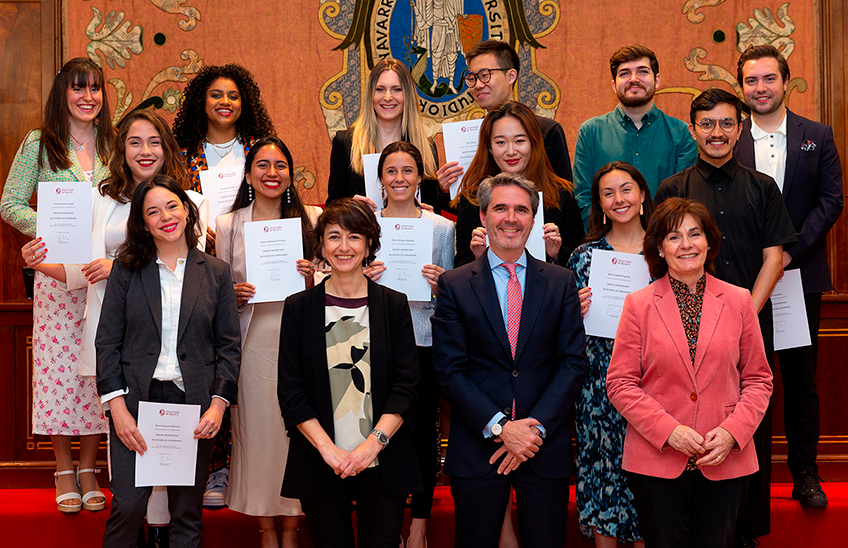Graduates of the fourth class of the Master's Degree in programs of study Curator of the University of Navarra Museum
At the event, which took place last Friday at the classroomMagna of the University's Central Building, Philosophyprofessor Lourdes Flamarique gave the keynote speech

PhotoManuelCastells/
10 | 05 | 2022
The students of the IV promotion of the Master's Degreein programs of studyof Curatorship of the Museo Universidad de Navarra graduated last Friday in a ceremony in which the professor of PhilosophyLourdes Flamarique, deputy director of postgraduate programgave the master class. Jaime García del Barrio, director of the Museo Universidad de Navarra; Nieves Acedo, director of Master's Degree; and María Gallegos, delegate of the graduating class, also took part in the celebration, which took place at the classroomMagna of the Central Buildingof the University of Navarra.
In his speech, Flamarique claimed the transformative power of reading and advised the graduates to "read, read a lot" and pointed out that "literature is a way of thinking and not merely an illustration of ideas or the exemplification of actions and behaviours. Literature is thought, research and finding". financial aidIn this line, he stressed that "literature captures us and makes us understand what we do: the weft that is woven between our decisions, our voluntary intentions, the accidents of life, and what is triggered by our actions, without having intended it, but which is already part of our action, has moral value and gives rise to a new status. Literature also makes it easier to recognise the moral significance of that indomitable set of circumstances, accidents, historical time, with its shadows and constant changes".
The delegate María Gallegos addressed two issues core topic, time and beauty. She argued that "the passage of time means the happening of our own history. Our existence is not given to us all at once, simultaneously, but rather it appears according to a successive, temporary development. We need time to be, to become, who we are". With regard to beauty, he stressed that "the different subjects of Master's Degreeare, in reality, different ways of making beauty the subjectof work. Our learning has consisted in knowing how to recognise it, promote it, and make it present in our societies".
In her speech, director Nieves Acedo also addressed the issue of workand emphasised the vocation of service: " workis exercised freely when it is not limited to the fulfilment of an imposition or a need, but when the agent carries it out in a spirit of freedom. That is, for a motive that exceeds that imposition or necessity - even if it coexists with them - and that can only be service. If the work is done out of selfishness or to please oneself, it is not a truly free action either. Selfishness is what enslaves us most.
He also stressed the importance of managing uncertainty: "What is typical of this stage, of these first steps, is the workin uncertainty. When we are trying to open doors, our state of mind is the same, and we don't know if tomorrow we will find what we are looking for or if it will take us a year. It is the search for a treasure, which in itself is already a professional workand in which we must not give ourselves any respite, but where the management of uncertainty is fundamental".
For his part, Jaime García del Barrio highlighted the search for happiness and the requirementsto achieve it: "Not a very high percentage of society declares itself to be happy, and to be happy there are three requirements: having a code of ethics. Being positive, which requires effort, and human virtues such as knowing how to work in a team, resilience, a vocation for service, curiosity and creativity".
At the same workshop, the exhibitionArte y Espacio de los ya graduados, under the direction of Professor Javier Antón, which can be visited at School of Architectureuntil 17 May, was inaugurated.
EXHIBITIONART AND SPACE
At the same workshop exhibition Art and Space IV was inaugurated at the School of Architecture University of Navarra, which can be visited until 17 May. The samplehas been produced by the students of the Master's Degreeunder the direction of Professor Javier Antón Sancho. "The students reflected on the role of space and its visual implications in the narrative of exhibitions. They met in four different groups and each group chose to analyse in depth a specific topicand its relationship with curatorial practices," explains Antón. Specifically, this edition the concepts selected were craft and design, synaesthesia, bodily empathy and the sensorial.
Thus, each member of the groupinvestigated a case study in depth, "with special emphasis on the analysis of spatial strategies as an interface between message and receiver. The case study analyses of each groupwere interrelated with each other, which enriched the understanding of topicin the curatorial field".
Each team then designed an exhibitionproposal based on their research, the resultof this theoretical-practical exercise was sampleat exhibition, located in the central space of the School of Architecture.
The recent graduates now face the last two challenges of the postgraduate program: the presentationof their workEnd-of-Degree Master's Degree, consisting of a exhibition, and the completion of a professional internship. Some of the centres that will host them are the Thyssen-Bornemisza Museum (Madrid), the Balenciaga Museum (Getaria, Gizpuzkoa), the Museo Nacional Centro de Arte Reina Sofía (Madrid), the Barbery Institute (Birmingham), the Centro de Arte 2 de Mayo (Madrid), Bombas Gens Centre d'Art (Valencia), the Fundación Juan March (Madrid) and the Fundación Koppel (Mexico City), among others. deadline is currently open for registration for the fifth edition, which will begin on 3 October.
